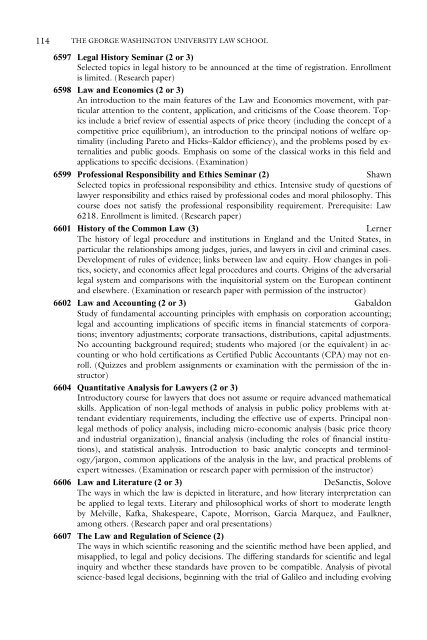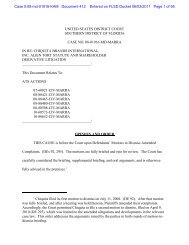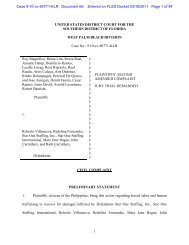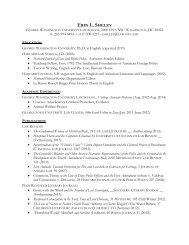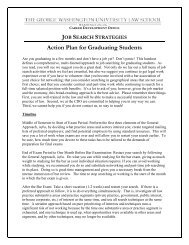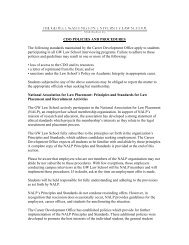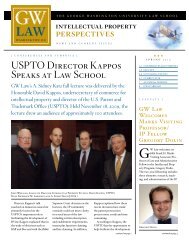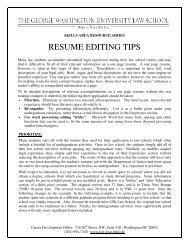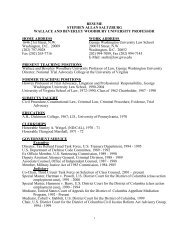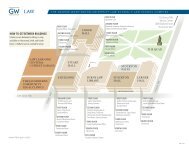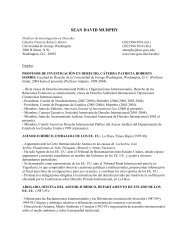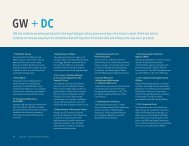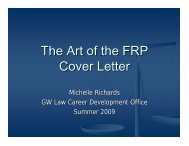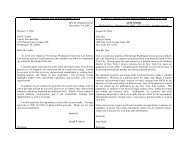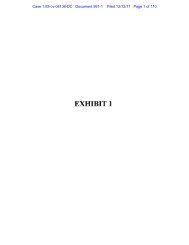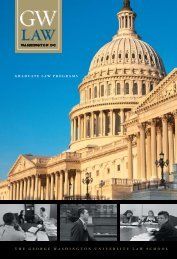The Bulletin - George Washington University Law School
The Bulletin - George Washington University Law School
The Bulletin - George Washington University Law School
- No tags were found...
Create successful ePaper yourself
Turn your PDF publications into a flip-book with our unique Google optimized e-Paper software.
114 THE GEORGE WASHINGTON UNIVERSITY LAW SCHOOL6597 Legal History Seminar (2 or 3)Selected topics in legal history to be announced at the time of registration. Enrollmentis limited. (Research paper)6598 <strong>Law</strong> and Economics (2 or 3)An introduction to the main features of the <strong>Law</strong> and Economics movement, with particularattention to the content, application, and criticisms of the Coase theorem. Topicsinclude a brief review of essential aspects of price theory (including the concept of acompetitive price equilibrium), an introduction to the principal notions of welfare optimality(including Pareto and Hicks–Kaldor efficiency), and the problems posed by externalitiesand public goods. Emphasis on some of the classical works in this field andapplications to specific decisions. (Examination)6599 Professional Responsibility and Ethics Seminar (2) ShawnSelected topics in professional responsibility and ethics. Intensive study of questions oflawyer responsibility and ethics raised by professional codes and moral philosophy. Thiscourse does not satisfy the professional responsibility requirement. Prerequisite: <strong>Law</strong>6218. Enrollment is limited. (Research paper)6601 History of the Common <strong>Law</strong> (3) Lerner<strong>The</strong> history of legal procedure and institutions in England and the United States, inparticular the relationships among judges, juries, and lawyers in civil and criminal cases.Development of rules of evidence; links between law and equity. How changes in politics,society, and economics affect legal procedures and courts. Origins of the adversariallegal system and comparisons with the inquisitorial system on the European continentand elsewhere. (Examination or research paper with permission of the instructor)6602 <strong>Law</strong> and Accounting (2 or 3) GabaldonStudy of fundamental accounting principles with emphasis on corporation accounting;legal and accounting implications of specific items in financial statements of corporations;inventory adjustments; corporate transactions, distributions, capital adjustments.No accounting background required; students who majored (or the equivalent) in accountingor who hold certifications as Certified Public Accountants (CPA) may not enroll.(Quizzes and problem assignments or examination with the permission of the instructor)6604 Quantitative Analysis for <strong>Law</strong>yers (2 or 3)Introductory course for lawyers that does not assume or require advanced mathematicalskills. Application of non-legal methods of analysis in public policy problems with attendantevidentiary requirements, including the effective use of experts. Principal nonlegalmethods of policy analysis, including micro-economic analysis (basic price theoryand industrial organization), financial analysis (including the roles of financial institutions),and statistical analysis. Introduction to basic analytic concepts and terminology/jargon,common applications of the analysis in the law, and practical problems ofexpert witnesses. (Examination or research paper with permission of the instructor)6606 <strong>Law</strong> and Literature (2 or 3) DeSanctis, Solove<strong>The</strong> ways in which the law is depicted in literature, and how literary interpretation canbe applied to legal texts. Literary and philosophical works of short to moderate lengthby Melville, Kafka, Shakespeare, Capote, Morrison, Garcia Marquez, and Faulkner,among others. (Research paper and oral presentations)6607 <strong>The</strong> <strong>Law</strong> and Regulation of Science (2)<strong>The</strong> ways in which scientific reasoning and the scientific method have been applied, andmisapplied, to legal and policy decisions. <strong>The</strong> differing standards for scientific and legalinquiry and whether these standards have proven to be compatible. Analysis of pivotalscience-based legal decisions, beginning with the trial of Galileo and including evolving


